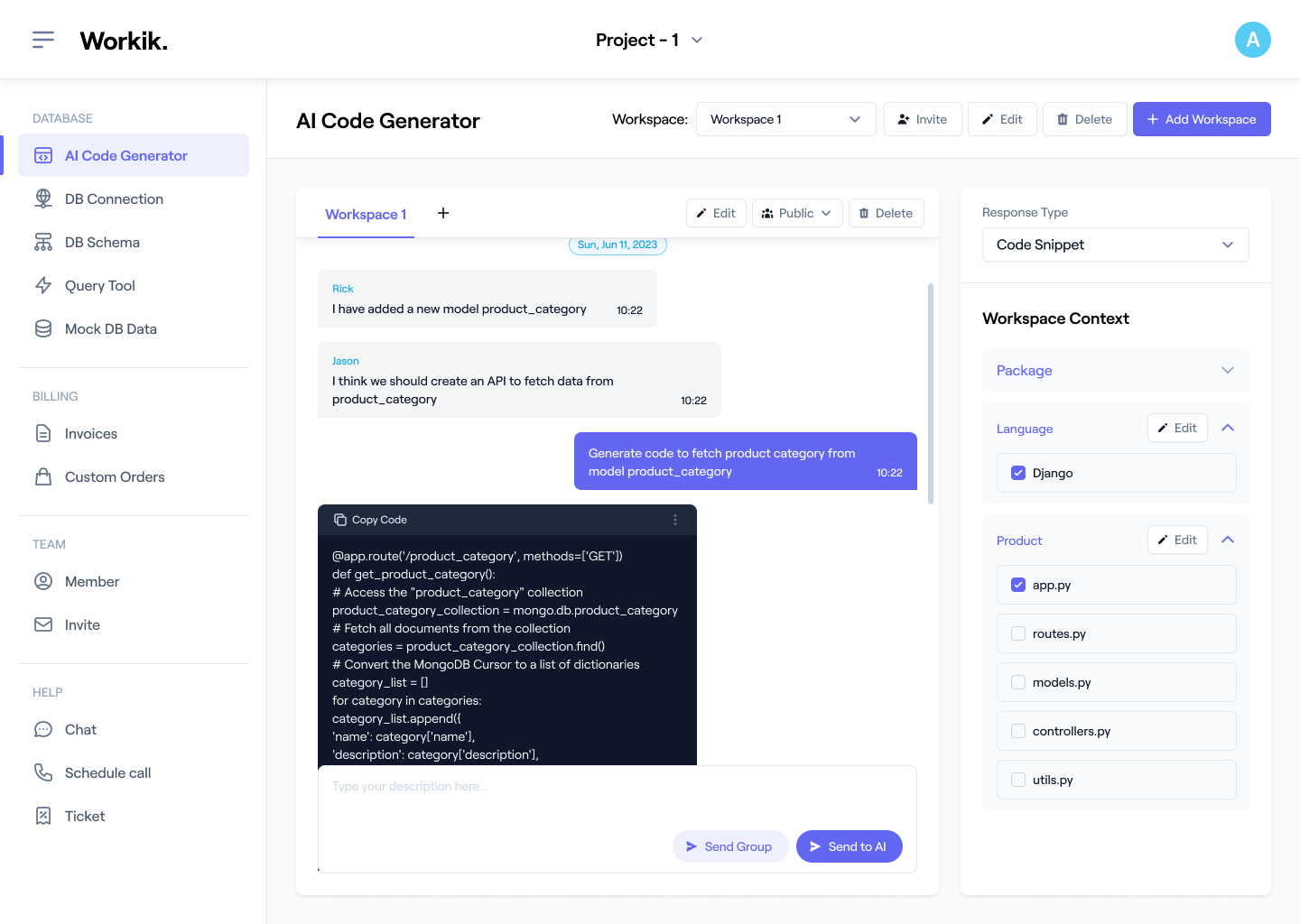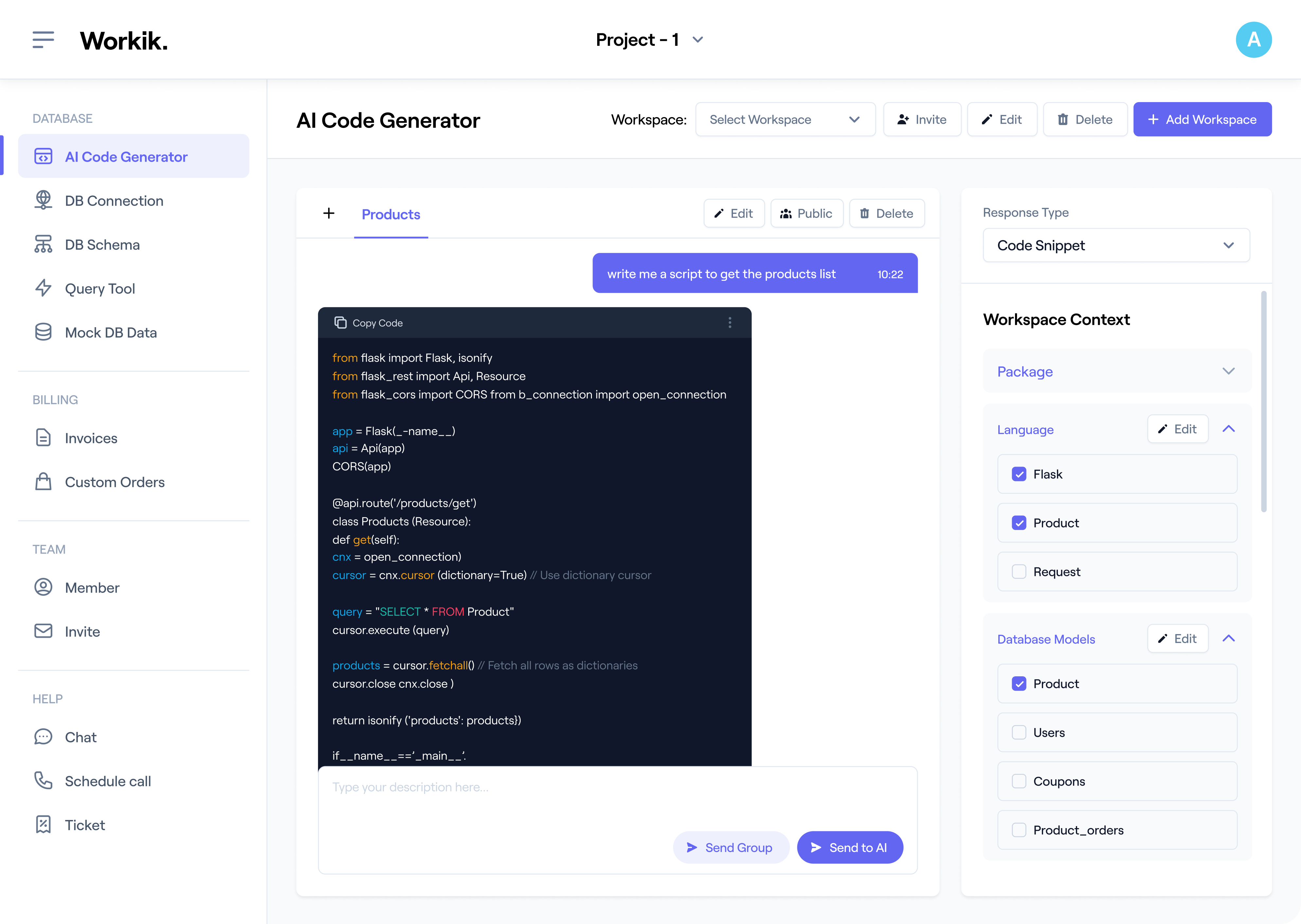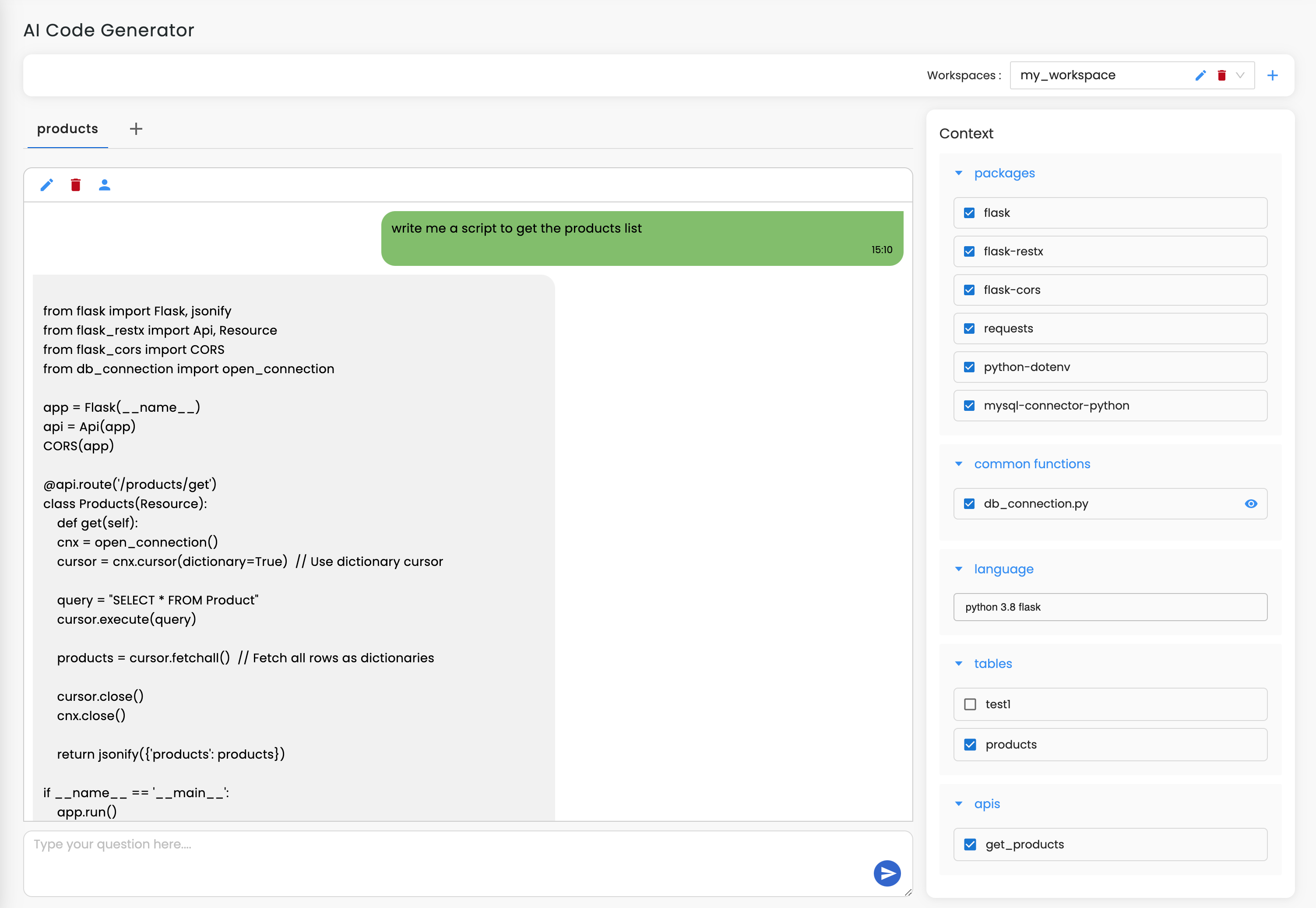
Join our community to see how developers are using Workik AI everyday.
Features

Enhance Functional Pipelines
AI structures complex pipelines with Core and Base, optimizing function composition and data handling.

Streamline Async Workflows
Build async code with AI-guided patterns using Lwt and Async for reliable concurrency and performance.

Generate Type-Safe Structures
Create precise, type-safe structures with AI-driven inference, leveraging Yojson and Cmdliner.

Optimize Testing & Debugging
Set up comprehensive tests with AI using Alcotest for solid coverage and Bisect_ppx for quick debugging.
How it works
Create your free Workik account in seconds to access Workik’s AI-powered OCaml code generator.
Import OCaml project files and sync repositories from GitHub, GitLab, or Bitbucket. Define modules, types, and functions for AI-driven code generation.
Input your specifications, and get AI-generated OCaml code, debug assistance, or optimized functional pipelines. From type-safe structures to async workflows, AI enhances your OCaml development.
Invite your team to collaborate on OCaml projects in Workik. Use the generated code ready for integration or deployment on your chosen platforms.


Expand
.png)
.png)
Expand


Expand


Expand


Expand


Expand


Expand


TESTIMONIALS
Real Stories, Real Results with Workik
Workik’s AI supercharges my OCaml development—type-safe structures and async pipelines are a breeze!

Sophia Lee
Senior Software Engineer
Learning OCaml was easy with Workik AI—it generates code, suggests patterns, and catches errors fast!

James Patel
Junior Developer
Workik’s AI optimizes OCaml testing and module setup, letting me focus on features over debugging!

Elena Ramirez
Full-Stack Developer
What are the popular use cases of Workik's AI for OCaml code generator?


Some popular use cases for Workik's AI-powered OCaml code generator include but are not limited to:
* Generate complex functional pipelines with minimal configuration.
* Automate asynchronous workflows with AI-driven concurrency patterns.
* Build type-safe data structures for reliable, error-free code.
* Set up CLI tools quickly using OCaml libraries like Cmdliner.
* Integrate OCaml applications with distributed data systems using Irmin.
* Streamline testing and debugging with auto-generated test cases and error insights.
* Enhance performance by generating optimized code for computationally intensive tasks.
What kind of context can I add in Workik AI related to OCaml code generation?


Workik offers diverse context-setting options for OCaml code assistance, allowing users to:
* Sync with GitHub, GitLab, or Bitbucket to integrate with your existing codebase.
* Specify programming language OCaml specifics like Core, Async, or Lwt.
* Mention preferred libraries or tools (e.g., Yojson, Alcotest).
* Define type constraints (e.g., custom types, exceptions, pattern matching rules).
* Add API blueprints via Postman or Swagger for connecting with external services.
How can Workik’s AI enhance OCaml’s functional programming capabilities?


Workik’s AI assists in functional programming by generating complex structures like higher-order functions and recursive algorithms. It optimizes functional pipelines for readability and performance, helping devs with tasks like hierarchical data processing and building immutable data flows.
Can Workik AI assist in optimizing OCaml’s pattern matching and error handling?


Absolutely! Workik AI suggests best practices, making it easier to handle exhaustive conditions and improve code safety. For example, AI can suggest ways to handle different transaction types in a single function, ensuring accurate type handling and streamlined error recovery.
How does Workik AI aid in building OCaml modules for scalable applications?


Workik AI offers support for creating modular, scalable OCaml applications by helping define inter-module dependencies and manage functors for code reusability. For developers working on microservices, Workik can help with base modules and establish clear boundaries between services.
How does Workik AI improve async processing in OCaml for real-time applications?


With libraries like Lwt and Async, Workik AI simplifies async workflows by suggesting concurrency patterns tailored to OCaml. For example, in real-time applications like chat systems or live dashboards, Workik can help manage asynchronous data fetching and event handling to keep operations non-blocking.
How does Workik AI assist with containerization and deployment?


Workik AI generates Dockerfiles optimized for OCaml, configuring Dune and dependencies. It also suggests CI/CD pipelines for GitHub Actions, automating build, test, and deployment to cloud platforms like AWS and Azure.
Can Workik AI generate REST APIs and database integration code for OCaml?


Yes, Workik AI automates REST API generation with Opium, handling routes, request validation, and JSON serialization. It also supports database integrations with Caqti and Pgocaml, generating type-safe queries and schema mappings for efficient data access.
Generate Code For Free

OCaml: Question and Answer
OCaml is a powerful functional programming language known for its type safety, expressiveness, and performance, making it ideal for complex applications like compilers, data processing systems, and static analysis tools. It supports both functional and imperative programming styles, and its advanced type inference system helps in catching errors at compile time, ensuring robust and maintainable code.
Popular frameworks and libraries used with OCaml include:
Standard Libraries:
Core, Base
Async Programming:
Async, Lwt
Web Frameworks:
Opium, Ocsigen
Testing Tools:
Alcotest, OUnit
JSON Parsing:
Yojson
Database Access:
Caqti, Pgocaml
Build Tools:
Dune
Compilers and Language Tools:
OCaml excels in compiler construction and custom language tools due to its type safety and speed.
Static Analysis and Verification:
Its strong type system enables early bug detection in static analysis tools.
Financial Modeling:
Valued for precision in risk analysis and algorithmic trading.
Data Processing Pipelines:
Ideal for robust applications handling large datasets efficiently.
Systems Programming:
Combines performance and type safety for networking and distributed systems.
Career opportunities and technical roles available for professionals skilled in OCaml include Compiler Engineer, Functional Programmer, Backend Developer, Static Analysis Engineer, Systems Programmer, Financial Software Developer, and Research Engineer.
Code Generation:
Generate OCaml code for functional pipelines and recursive functions.
Type Inference Optimization:
Suggest type-safe structures to enhance code robustness.
Async Programming:
Simplify async workflows using Lwt and Async libraries.
Data Structure Design:
AI-driven suggestions for optimized, immutable data structures.
Testing and Debugging:
Generate test cases with Alcotest and enhance debugging workflows.
Performance Profiling:
Identify bottlenecks and recommend optimizations.
Documentation Generation:
Automate documentation for improved maintainability.
Code Refactoring:
Assist in improving code quality and organization.
Explore more on Workik
Get in touch
Don't miss any updates of our product.
© Workik Inc. 2026 All rights reserved.

